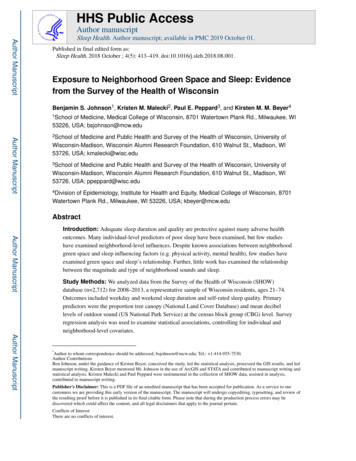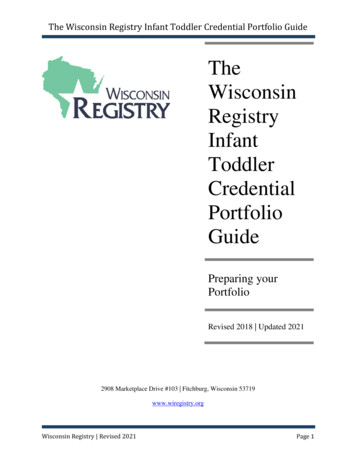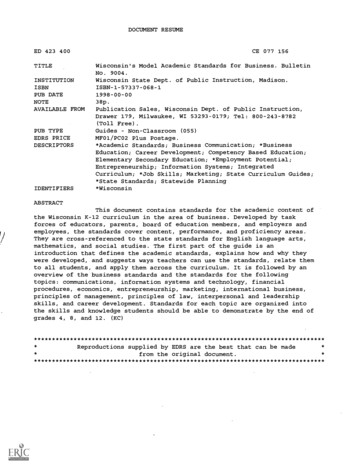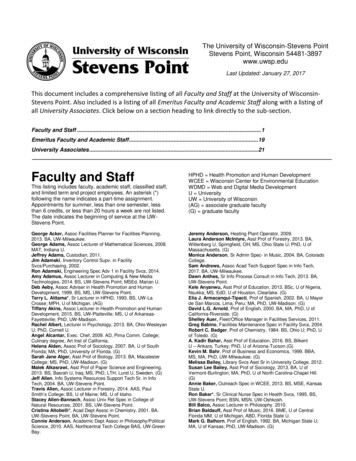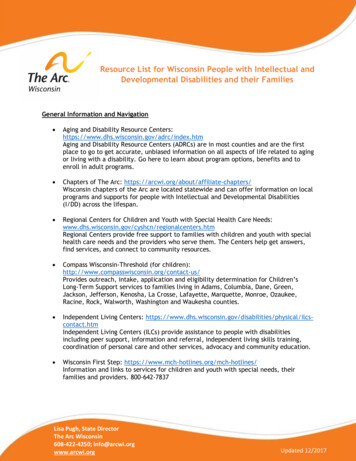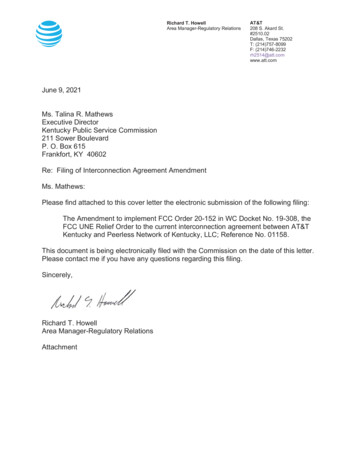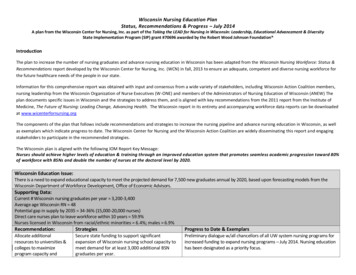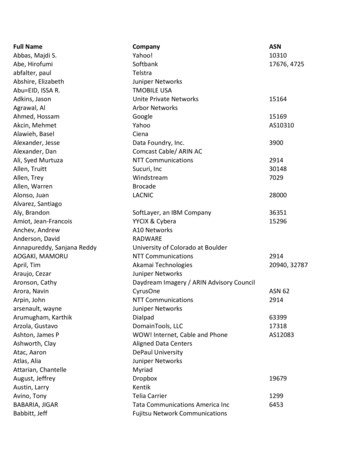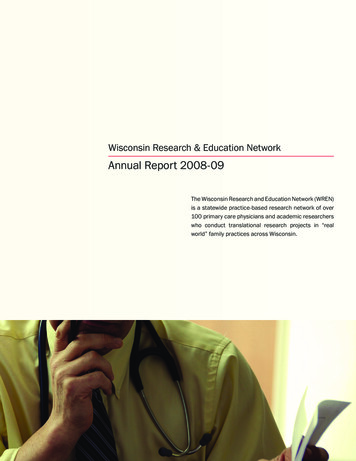
Transcription
Wisconsin Research & Education NetworkAnnual Report 2008-09The Wisconsin Research and Education Network (WREN)is a statewide practice-based research network of over100 primary care physicians and academic researcherswho conduct translational research projects in “realworld” family practices across Wisconsin.
Wisconsin Research & Education NetworkUniversity of Wisconsin School of Medicine and Public HealthDepartment of Family Medicine777 South Mills StreetMadison, WI 53715Phone: 608.262.1112Fax: 608.263.5813www.wren.wisc.eduDesign: Kelly Kwiatkowski
ContentsMission Statement.WREN Leadership.WREN Staff.WREN Membership.WREN Clinics.WREN Infrastructure and Services.Projects.Annual ications.Fundraising.Budget.4455567889991010
I. Mission StatementThe mission of the Wisconsin Research and Education Network is to improve health outcomes for the people of Wisconsinthrough education, and through promoting and conducting primary care research in partnership with primary care cliniciansand the communities they serve.II. WREN LeadershipSteering CommitteeThe WREN Steering Committee consists of representatives from the University of Wisconsin and Medical College ofWisconsin Departments of Family and Community Medicine and WREN general membership. The Steering Committeeestablishes overall direction and policy for the organization.Dennis Baumgardner, MDAurora UW Medical GroupJohn Beasley, MDUW Department of Family MedicineRod Erickson, MDLake Tomah ClinicKari Lathrop-Capaul, MDAffinity Medical GroupValerie Gilchrist, MDUW Department of Family MedicineMary Beth Plane, PhDUW Department of Family MedicineKen Schellhase, MDMedical College of WisconsinGreg SimmonsMetaStar, Inc.Paul Smith, MDUW Department of Family MedicinePaul Treder, APNPAffinity Medical GroupAdvisory CommitteeWREN has assembled and convened its first Advisory Board in November 2008. The board’s purpose is threefold: 1) developand make policy and procedural recommendations to the Steering Committee, 2) advocate for WREN to the general publicand to funders, and 3) advocate for Wisconsin citizens in regard to WREN activities. Greg Simmons will serve as Chair of theAdvisory Board for a three-year term. The Advisory Board will convene again May 7, 2009 in Madison, WI.Howard Bailey, MDWisconsin Network for Health Research (WiNHR)Larry PheiferWI Academy of Family PhysiciansMarc Drezner, MDUW Institute for Clinical and Translational ResearchChuck Shabino, MDWisconsin Hospital AssociationMolly Jahn, PhDUW College of Agricultural and Life SciencesGreg SimmonsMetaStar, Inc.Nancy NankivilWisconsin Medical SocietyPaul Smith, MDUW Department of Family MedicineKristin McManmonSt. Mary’s HospitalGeoffrey R. Swain, MD, MPHCity of Milwaukee Health DepartmentKathleen O. SmithUW School of Medicine and Public HealthBruce L. Van Cleave, MDAurora Health CareZorba Paster, MDDean Health SystemSteve Yale, MDMarshfield Clinic4
III. WREN StaffWREN went through substantial growth over the last two years. Funding through the UW School of Medicine and PublicHealth’s Clinical Translational Science Award (CTSA) has allowed WREN to expand its staff from a Director and a full-timenetwork coordinator to two full-time regional research coordinators, located in Eau Claire and Milwaukee, two full-timeresearch coordinators in Madison, a half-time administrative assistant and a 75% time project manager/technical writer.Due to the current economic climate we made some cutbacks to the budget including personnel. One full-time staff position,a regional research coordinator has been vacant since September 2008 and we decided not fill this position. We havereallocated duties to other staff. We made shifts in salary support for WREN staff. During part of 2009, the Center for UrbanPopulation Health employed Katherine Pronschinske 50% time. The Eau Claire Family Medicine Residency employs PeggyO’Halloran 40% time.Paul Smith, MD, WREN DirectorMichael Grasmick, PhD, Network CoordinatorAdina Tucker, Administrative AssistantKelly Kwiatkowski, Project manager/Technical writerPeggy O’Halloran, Regional Research CoordinatorCindy Colombo, Regional Research CoordinatorKatherine Pronschinske, Regional Research CoordinatorStudent hourly0.80 FTE1.00 FTE0.50 FTE0.75 FTE0.60 FTE1.00 FTE0.50 FTE10-15 hr/wkIV. WREN MembershipWREN membership is available to primary care clinicianswho actively practice in Wisconsin or academicresearchers whose primary place of employment is locatedin Wisconsin. WREN confirms membership annually andoffers a choice of becoming a dues-paying generalmember, an affiliate member, or a student member.Currently WREN membership includes 39 generalmembers, and 89 affiliate members (128 total).WREN refined the definitions of affiliate and general FSOsceolamembership, and promoted these new designationsto attract members this year. Also in 2008, we madecomplete membership information available onthe WREN website, and added the option for newmembers to register online. We will continue with theseefforts in the coming year to expand our partnership withfamily practice clinicians across the state.V. WREN ClinicsWisconsin Research &Education NetworkClinic LocationsEau ClaireFSTomahFSFSFull Support ClinicClinicWREN has practice support agreements withfive medical organizations at this time. AuroraHealth Care Inc. is new to WREN in 2008 and has three practicesparticipating in WREN projects: St. Luke’s Family Practice Center, AuroraSinai Family Care Center, and Wiselives Center for Wellbeing. To facilitateimplementation of WREN projects on site, these Full Support Practices areMaustonMadisonFSMilwaukeeFS FSDubuque5
assigned a WREN Regional Research Coordinator and receive 10,000 per year for approximately 20% FTE of clinic stafftime to facilitate implementation of WREN projects on site. Osceola Medical Center, Osceola, WI Mile Bluff Clinic, Mauston, WI Franciscan Skemp Healthcare, Lake Tomah Clinic, Tomah, WI The Medical Associates Clinic, Dubuque, IA Aurora Health Care Inc., St. Luke’s Family Practice Center, Aurora Sinai Family Care Center and Wiselives Center forWellbeing, Milwaukee, WIVI. WREN Infrastructure and ServicesThe Wisconsin Research and Education Network (WREN) is a statewide practice-based research network of over 128 primarycare physicians and academic researchers who conduct translational research projects in “real world” family practicesacross Wisconsin. WREN provides investigators an established, efficiently run primary care research infrastructure thatincludes: A “real world” laboratory for conducting research that answers questions important to primary care. Research support services like grant proposal review and preparation, IRB consultation, subject recruitment, datacollection, data analysis and manuscript consultation. Network facilitation of statewide collaborations between academic researchers, physicians, administrators andorganizations.WREN InfrastructureDedicated primary careclinics & cliniciansacross WisconsinWREN has agreements with nearly 40clinics and 100 individual clinicians in 24communities, from 17 different healthcare organizations distributed statewideto conduct research and QI projects.Staff resourcesWREN has staff dedicated to facilitateresearch and QI projects across the state.Research supportservicesIRB consultation, proposal review andpreparation, manuscript consultation, andmore.NetworkingWREN facilitates collaboration betweenresearchers, clinicians, administrators,organizations, and communities withsimilar research and QI interests.6
VII. ProjectsProblem Density, Mental Workload and Medical Error in Primary Care PracticeThis was an Agency for Healthcare Research and Quality (AHRQ) funded project aimed at studying the interactions of thenumbers of problems presented by the patient at clinical visits and the mental workload and errors associated with thenumber of problems. The study was conducted across four primary care practices affiliated with WREN—Wingra Clinic, MileBluff Clinic, Lake Tomah Clinic and Dubuque Medical Associates. Jon Temte, MD, PhD, is the principal investigator of thisproject. Analysis is complete and investigators are in the process of developing manuscripts for publication.Proactive Risk Assessment of Primary Care of the Elderly (PRA)PRA used proactive risk assessment methods to identify hazards and model risk in the primary care of elderly patients.This one-year project is funded by the Agency for Healthcare Quality and Research (AHRQ) with Bentzi Karsh, PhD in the UWDepartment of Industrial Engineering as principal investigator. This project placed an engineering graduate student in 15different practices to observe doctor-patient interactions during an office visit for patients over the age of 65. Data analysisand manuscript preparation are underway.A Human Factors Intervention to Reduce Risk In Primary Care Of The ElderlyThis project builds on the findings of the above PRA study to evaluate an intervention to improve care of the elderly in primarycare practices. This three-year project is funded by the AHRQ with Bentzi Karsh, PhD in the UW Department of IndustrialEngineering as principal investigator. This project will involve a care coordinator calling patients one week before their visitto clarify the agenda for the visit, and gather all information needed to address the agenda issues and brief the care teamthe day of the visit. This project is in the planning and clinic recruitment stage.Wisconsin Initiative to Promote Healthy Lifestyles (WIPHL)WREN entered the third year of its partnership with the Rich Brown, MD and the Wisconsin Initiative to Promote HealthLifestyles by providing quality improvement support to three clinics in Hillsboro, Wonewoc, and Elroy.Quality of Life and Depression as Determinants of Treatment Adherence in Hypertensive PatientsThis project is funded by the American Heart Association with Leonelo Bautista, MD, PhD in the UW Department ofPopulation Health serving as principal investigator. Patient recruitment for this project has reached 116 patients with newlydiagnosed hypertension being started on antihypertensive medications to date with the goal of reaching 280 patients.Data collection has been ongoing since January 8, 2008 with 20 practices. In addition to 7 full support clinics participating,WREN partnered with 13 University of Wisconsin Department of Family Medicine Clinics to increase the number of patientsrecruited to the study. As a result, recruitment to the study increased dramatically this year with a target to meet the finalrecruitment goal in late 2009.AZMATICS: AzithroMycin/Asthma: Trial in Community SettingsThis project is funded from several sources including Pfizer and the Joint Grants Awards Program of the American Academyof Family Physicians/AAFP Foundation. David Hahn, MD is the principal investigator and Michael Grasmick, PhD is theCo-Investigator. This project is a pilot double blind randomized controlled trial of the treatment of adult asthma withazithromycin. This project has currently enrolled 73 randomized and 19 open-label patients and is slated to end recruitmentin August 2009.Assessing Risk in Ambulatory Medication Use After Hospital TransitionsThis project is part of a federal K award for new researcher training and career development for Tosha Wetterneck, MD. Dr.Wetterneck and her research assistant have completed evaluation of two practices to assess and identify hazards duringthe transition from hospital care to ambulatory care, and data collection at the third and final clinic is underway. Findingswill provide pilot data for a future federal grant.7
Expanding Primary Care Treatment of Chronic Kidney DiseaseDavid Feldstein, MD received funding from the UW Institute of Clinical and Translational Research to conduct a one-yearproject to develop and test a web-based system to track the treatment of patients with Stage 3 Chronic Kidney Disease.This project has completed telephone semi-structured interviews and focus groups with participating WREN and WiNHRphysicians. WREN assisted with clinician recruitment and conducted focus groups for this project, and will assist with thesecond phase of this project in 2009.Establishing Benchmarks for the Medical Office Survey on Patient SafetyWREN is one of 12 practice-based research networks across the country participating in this AHRQ project. Lyle J. Fagnon,MD from the Oregon Rural Practice-based Research Network is the principal investigator. WREN will recruit at least 25practices to complete a survey about their patient safety environment. WREN member practices will be invited to participatealong with practices from the UW-Madison’s Departments of Family Medicine, Pediatrics, and Internal Medicine. Surveyresults from the Wisconsin practices will be combined with those from other practices across the country to establishbenchmarks for a national database on patient safety information.Improving the Health Literacy Environment of Wisconsin Hospitals - A Collaborative ModelWREN began this project with funding from the American Academy of Family Physicians. Paul Smith, MD serves as theprincipal investigator. This project is training nine adult students enrolled in the GED program at Omega School in Madisonto be consultants to St. Mary’s hospital to improve the hospital’s health literacy environment. The project is in the finalphases of program evaluation.VIII. Annual MeetingsOn May 1-2, 2008, WREN held its annual Convocation of Practices in Wisconsin Dells with approximately 33 WREN membersand friends of WREN attending. The group discussed the health needs of the state, and with the help of facilitator JohnHickner, MD, helped to identify future research areas for WREN to pursue.The annual WREN Research and Quality Improvement Forum took place on November 6-7, 2008. The forum was expandedto include quality improvement. This year’s forum grew from 42 attendees last year to 72 attendees. WREN welcomed itsfirst nationally recognized plenary speaker, Dr. Denice Cora-Bramble, who spoke about cultural competency in rural andurban clinical settings. Dr. Kenneth Schellhase gave a presentation on access to dental care for children. Dr. John Freyspoke on community-based health research and primary care. Ten quality improvement sessions were presented whichcovered topics like quality and safety in nursing education, parent satisfaction in pediatrics, best practices in cervicalcancer screening, improving the health literacy environment, and more. Twelve researchers also presented their work.IX. CommunicationsThis year we have completed our branded look for WREN with a new logo. On the advice of the UW Foundation, we created aconsistent WREN identity that will help us build awareness about WREN’s mission and communicate more effectively aboutwhat we do. We used this branded look for our first fund raising campaign. This branding has further elevated WREN to alevel that is perceived as reputable and professional. Materials created with this branding include: membership materials,annual meeting materials, website content, promotional posters, the annual report, policy papers, information sheets, andthe WREN newsletter.8
X. PresentationsTo encourage membership and participation in WREN projects, Paul Smith, WREN Director, made seven formal presentationsand attended numerous meetings to talk to numerous audiences about WREN and its mission in 2008. WREN staff andcollaborating researchers also presented on WREN research projects nationally and in Wisconsin.T emte, J. “Complexity in Primary Care.” American Academy of Family Physicians National Research Network 2008Convocation of Practices. ietzer, L. “Quality of Life and Depression as Determinants of Treatment Adherence in Hypertensive Patients.” 2008KAHRQ National PBRN Research Conference. rasmick, M. “What are Important Health Issues for Low Literate Adults?” A Focus Group Evaluation of Health LiteracyGIssues” 2008 AHRQ National PBRN Research Conference. rasmick, M. “Speeding the Application of Medical Research and Quality Improvements Through WREN?” 2008 PLATOGFrontiers in Life Science [Televised on WHA Public Television]. ronschinske, K. “Proactive Risk Assessment of Primary Care of the Elderly.” 2008 AHRQ National PBRN ResearchPConference. O’Halloran, P. “Complexity of Family Practice: A WREN Study.” 2008 AHRQ National PBRN Research Conference. Smith,P. “Health Literacy: The Strongest Demographic Determinant of Health Status and How to Measure It.” [Workshop]2008 AHRQ National PBRN Research Conference. mith, P. “Health Literacy: The Missing Demographic.” [Workshop] 36th Annual Meeting of the North American PrimarySCare Research Group.XI. PostersLapin, J. “Proactive Risk Assessment of Primary Care of the Elderly.” 2008 AHRQ Annual Conference. mith, P. “Statewide Research and Quality Improvement Projects in Wisconsin.” University of Wisconsin Health QualitySWeek.XII. Publications roceedings from the Wisconsin Research and Education Network’s 2007 Research Forum. Wisconsin Medical Journal.P2008; 107 (7): 339-341.T emte, J. and Grasmick, M. Recruiting Primary Care Clinicians for Public Health and Bioterrorism Surveillance. WisconsinMedical Journal. 2009 (accepted for publication). ddy JJ, Gideonsen MD, Song JY, Grobman WA, O’Halloran P. Pancreatitis in Pregnancy. Obstet Gynecol. 2008ENov;112(5):1075-81.9
XIII. FundraisingWREN launched its first campaign in December 2008 to raise funds for an endowment to support primary care research.To date WREN has exceeded its goal of 8,000. As of April 2009 WREN received 8025 in donations. The UW-MadisonDepartment of Family Medicine and the Wisconsin Academy of Family Physicians will provide matching funds, each up to 8,000, making the WREN fund 24,025 this fiscal year. These funds are increasingly important to WREN given the currenteconomic climate. WREN is making every effort to diversify its funding sources in order to continue its long tradition ofconducting primary care practice-based research in Wisconsin.XIV. BudgetDuring 2008-09 WREN had a total operating budget of 581,629. This funding was from a diverse mix of sources includingICTR-CAP, AHRQ, AAFP-Foundation (funded 2 grants), WAFP, ICTR Type 2 Pilot Grant, American Heart Association and WiNHR.The table below illustrates the funding source as percent of the total.FY 2008-09 Funding SourcesAmount FundingPercent TotalICTR-CAPAmerican Heart AssociationAHRQ (PRA2)WAFPDFMDonations/GiftsWiNHRICTR Pilot Funding 454,691 57,304 28,540 8000 8000 8025 6000 574878.2%9.9%4.9%1.4%1.4%1.4%1.0%1.0%AAFP Foundation (Azmatics)AAFP Foundation (Health Literacy) 3321 2000Total 581,6290.6%0.3%10
Wisconsin Network for Health Research (WiNHR) Marc Drezner, MD UW Institute for Clinical and Translational Research Molly Jahn, PhD UW College of Agricultural and Life Sciences Nancy Nankivil Wisconsin Medical Society Kristin McManmon St. Mary's Hospital Kathleen O. Smith UW School of Medicine and Public Health Zorba Paster, MD Dean Health System
